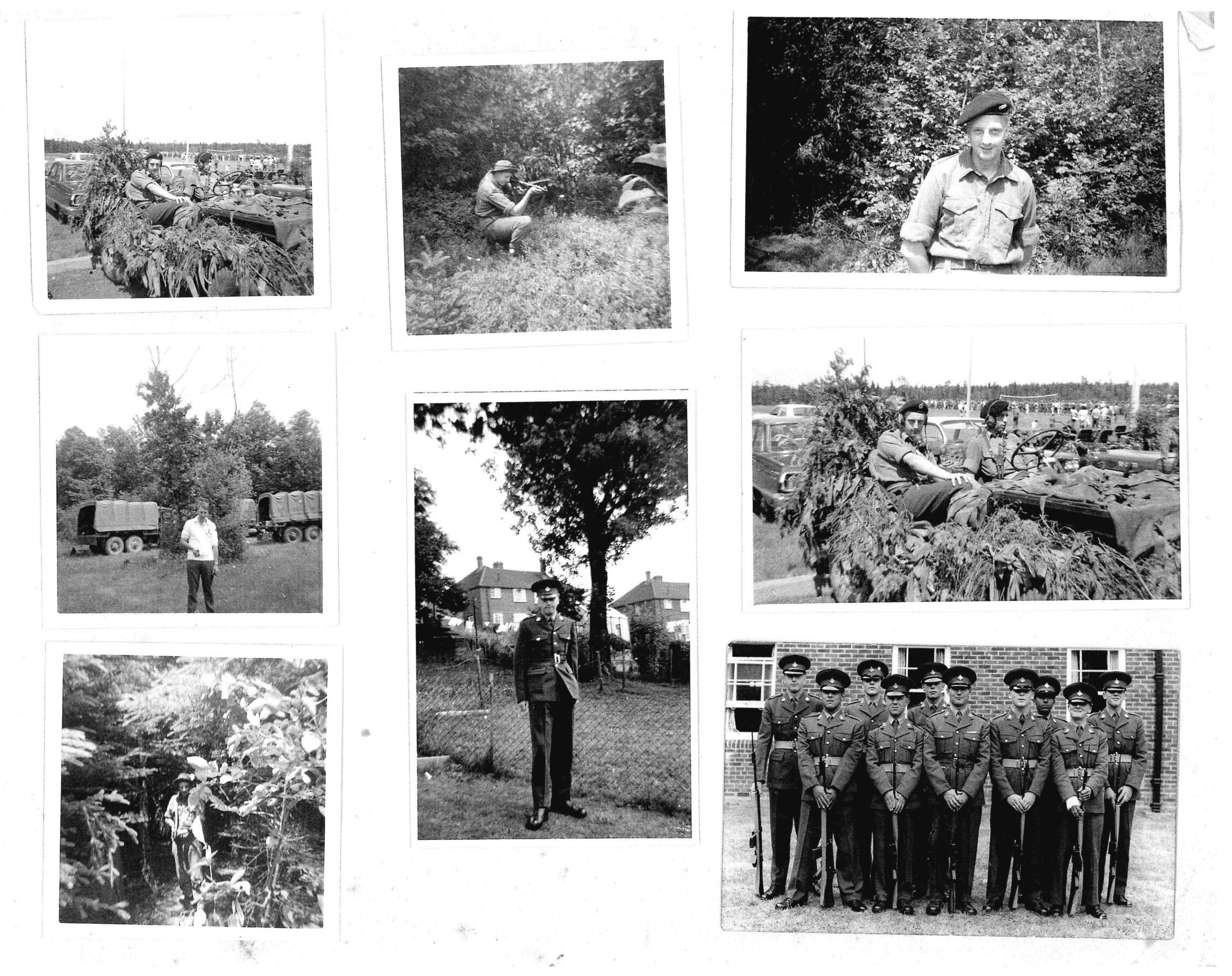In the two and half years he served in the Queen’s Royal Surrey Regiment, he travelled all over Europe and Canada, and progressed from a “basic squaddie, as everyone was, on a platoon” to working in weapon training. He shared that weapon training involved teaching “people to use sub-machine guns, machine guns (GPNGs) [and] the earlier Bren guns” safely.
The 1960s was a time of geopolitical tension, which meant Ernie and his comrades were to serve on the East German border so that they might protect civilians. He explained, “The Russians were the enemy at the time, and they were very busy shooting their own people and the East Germans”. Continuing, Ernie said that whilst policing the border, “every now and again, you heard a bang, and then you found a body”.

Despite how much Ernie was enjoying his time serving, his position with the Army was about to be cut short owing to an unexpected injury sustained while working.
Immediately after completing a river crossing on the River Weser in Germany, Ernie and his comrades were instructed to climb up a cliff before joining a live firing exercise. During this exercise, it became apparent to both Ernie and the Officer in charge that there was something amiss with Ernie’s senses. Ernie shared that “they were using live rounds and told you to take cover and get down. Unfortunately, I didn’t hear them, and the first thing I know about it is I could see all these bullets flying around me.”
Fortunately, Ernie still managed to take cover in time, but his delayed response to the instruction issued meant he was then ordered to see the medical unit for a hearing test, of which he said sadly, “of course, I failed it”.
Ernie explained how after all the time he had worked in weapon training, “he got all the gunfire”, which had deafened him.
Whilst Ernie was unable to continue the role he loved, the Army supported him in finding his next position with the Ministry of Defence. After a couple of years, an old friend inspired Ernie to try out for the police force, which launched a career of over 30 years of serving in both built-up and rural areas alike. For securing his place in the force, Ernie credited “the Chief Constable at the time”, who was an ex-Lancasters bomber pilot, and therefore “liked ex-servicemen because they were disciplined”. On serving in the police, Ernie stated that they “were doing quite a lot of good, helping people, which was something I always wanted to do”.
In 2021, following retirement, Ernie became critically ill and after a couple of stretches in hospital, was offered a place at Care for Veterans for a couple of weeks for respite. Ernie stated that he “had actually become very ill and very nearly died – my wife was told that I wasn’t going to survive it”. As Ernie moved from a respite stay to a long-term resident, so has his needs developed. Ernie’s health has been tumultuous at times, but he had only the highest words of praise for the carers who’ve looked after him. Of those who have worked closely by his side, he said, “I’ve got nothing but the utmost respect for our carers. They are brilliant, they really are. My lot here are fantastic, and I wouldn’t swap them for anybody.”
In March, Ernie had his leg amputated due to cellulitis. Whilst this has meant that his mobility has been limited, Ernie has lots of hope for the future. He has recently received an assessment for an adjusted wheelchair which will be tailored to his needs. Once he is able to, Ernie intends to “join gardening”, using the greenhouse and wheelchair-friendly raised beds, and is “looking forward to getting back into physiotherapy”. The in-house physiotherapist team has previously helped him work on old neck and arm injuries. Frequenting the Wellbeing Hub is also on the cards, especially when they’re holding a quiz. Ernie said, “I used to go to the Wellbeing Hub a lot – I really enjoy the quizzes to get the old brain working”.

Ernie at Care for Veterans on his 76th birthday
When talking with Ernie, it became apparent that he found something especially comforting in living at Care for Veterans. When asked what his favourite thing was about living at the home, Ernie stated, “To me, it’s almost like coming home with the army”. From living amongst other ex-service personnel to the way the home is decorated, with photos which adorn the walls, showcasing our history of helping veterans since 1919, this feeling of home has been frequently identified amongst residents.
Ernie added, “you see all these pictures on the walls [at Care for Veterans] from people who were there on D-Day. I am sure you have seen the one of the D-Day Landings. My boss was on that landing, and he was a Royal Marine Commander. I have got the utmost respect for people who have served during wartime, including my father, who was wounded at El Alamein.”
“It is an honour to take care of our veterans. Ernie is a fantastic character, and we all enjoy having him here with us and getting to learn more about his career. The team here are all intent on helping him to accomplish his goals and do everything we can to ensure Ernie has the best possible quality of life.” – Head of Clinical Services, Andy Blyth
If you would like to learn more about Care for Veterans, click here.
Responsive site designed and developed by
Click to go Madison Web Solutions' website